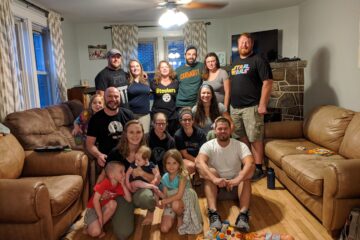Over the last few months of CityWell’s launch process, I’ve stepped back and asked this question a lot. What is a church? What is the Church? How do we know if we’ve truly launched a church? How do we know we are effectively glorifying God in what we are doing? How do we gauge our kingdom’s effectiveness? The process has created more questions than answers for me but I wanted to take a few minutes and write this post to serve as a journal entry of my thoughts.
A few weeks ago, I informed our team that I’m at the place where my hand is laying open saying “God what’s it look like to start this church according to your plan?” Seeking that out has been an adventure. Recently I described the process I’ve been taking as “deconstructing the Church” and Stef informed me that I’m using radical language. The majority of people we know who have begun the process of deconstruction end up walking away from faith altogether. That’s not the direction this process has taken me at all. I’ve paused and said, “if I just look in Scripture what does a local church look like?”
To illustrate my process, I want to talk a little about Legos. My kids love getting new Lego sets and we immediately build them according to the instructions. Sometimes we miss a piece here or there but they are usually close. A few days later one of the kids thinks adding something would make it better, then another (who is too young to know better) smashes part of it. Over time the Lego race car starts taking a new look and new shape. You can still see most of the original structure, but in the kid’s minds, they have made it better. Eventually, that Lego car can’t drive, turn, or serve any real purpose because of all the “improvements.” At that point it gets tossed to the side, robbed for parts, and left to sit until we strip it to the base and build it out again from scratch.
When we started the process of launching CityWell our goal was to build onto the model of “church” we knew. We took a Lego set that already had a lot of people’s “improvements” and we planned to add on. But was that God’s plan? And was our plan really to launch a church?
Now back to the original question: What is a church?
Q. Is it a crowd of people who sing along with a band and listen to an inspiring message?
A. NO. That’s a performance.
Q. What if we add in the option for each person to gather together over a shared interest or life stage and encourage one another? Then are we a church?
A. No. That’s a self-help group.
Q. What if we add the option to volunteer within the organization to help drive the mission forward? Then are we a church?
A. No. That’ a club.
Q. So when does a crowd of people become a biblical church?
A. That’s the question I’ve been wrestling with and am trying to answer myself. Although I don’t have all the answers, here’s my new working definition of a “church”. A church is a group of people who are mutually submitted to Christ and are living on mission together.
Let’s break this down a little more:
A group of people: This means you can’t do church alone. You can’t be the church alone. The word we translate as “Church” in Greek was a common word for “assembly”. It literally just meant a group of people.
Mutually submitted to Christ: When we look at scripture we see churches studying God’s word together, worshiping together, praying together, providing for one another, and holding each other accountable. All of this happens under the umbrella of the group’s submission to Christ, and commitment to one another.
Living on mission together: The early church saw regular salvations, sent people out to start new churches, and supported the new churches they sent. Jesus told them to live a life that created disciples (Matthew 28:19-20) and he would have the Holy Spirit empower them to be His messengers (Acts 1:8).
With this definition of “church”, I have started looking at the modern American church in a whole new light. Most of what we call “churches” are actually networks of churches that all operate under the same name. Think about the typical church’s youth ministry. Usually, there are a handful of adults who love Jesus, encourage each other forward, and commit to working together on a mission to impact these teens for Christ. They are a church within a church. Likewise, we have women’s (ministries) churches, men’s (ministries) churches, and more. The leaders of the ministries are apostles, prophets, evangelists, pastors, and teachers, but we don’t use that language.
Within our present modern-day church model, we think of our Sunday morning gathering as the entry point, and then these ministries as the place where true life change happens. Unfortunately, 50% or more of the people who regularly attend “church” never move beyond attending a performance. But our model has the Sunday performance as the opening in the sales funnel of Christianity. So, we have the majority of the people who want to serve Christ help support our Sunday morning gatherings. We spend insane amounts of money to build rooms that can hold large crowds once a week. We then spend even more money marketing and advertising these Sunday gatherings because the entire system depends on the crowd growing.
I’m wondering what would happen if we intentionally ignored having a big public “church” service and instead created “micro-churches”. This idea isn’t unique to me, Francis Chan and Brian Sanders have been experimenting with it for years. I’m just starting to wonder if they were ahead of the curve.
What if we broke apart our big churches into micro-church networks and encouraged everyone to get involved in one. People could be involved in just one, or many micro-churches according to their passions, gifts, time, and needs.
The Church (Big C-universal) could engage in niche ministry like never before while cutting costs. The casual Christian, if that even exists, would be challenged to count the cost of following Christ (Luke 16:28-30). The priesthood of believers would be realized in a more complete way. Within these smaller groups, there would be better accountability and personalized discipleship.
But we would lose control…
If the modern church adopted this model of ministry, experts would have way less “authority” and seeing how crazy people are in our present model, it’s terrifying to think what would happen if we let go. But looking at the moral failures of those with the “authority” and the damage that it causes is the risk really any different? Could the risk actually be smaller?
Landing the plane
My brain has been doing summersaults recently as I think through these ideas trying to let Scripture and the Holy Spirit be my guide.
I want to be clear that I’m not trying to nail the 95 theses to the door of the modern-day church. I’m not saying “Everyone is doing it wrong and I’m about to do it right.” My goal is to ask great questions, take things apart, and build something for God’s glory. My hand is laying open before God. I’m crying “Here I am…Send me…” If CityWell ends up looking like the modern church, I’m comfortable with that. If it looks completely different I would be content with that as well. My greatest concern is the glory of God and impacting the community.
So, on September 12th, 2021 we will be gathering a group of people in my home to begin experimenting with being a micro-church. I don’t know where we will end up going from here but we invite anyone who’s interested to join us on this journey. Interesting in attending? Please register here.



1 Comment
CityWell - New Years Church Planting Update - We Six Gricks · January 3, 2022 at 7:04 am
[…] are the minimum requirements for something to be a church?” I write a little about this on our family blog. We realized quickly that there are things we see the church doing in scripture that are really […]